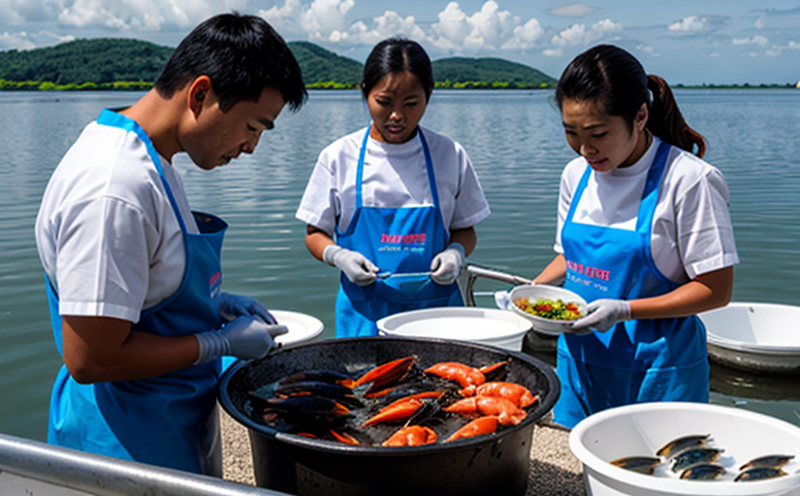ISO 14507 Amnesic Shellfish Poisoning (ASP) Detection
The detection of Amnesic Shellfish Poisoning (ASP) is critical for ensuring the safety and quality of seafood products, particularly those derived from shellfish. This service employs ISO 14507, a globally recognized standard that provides methodologies for detecting ASP toxins in various food and feed samples. Our expertise lies in providing accurate and reliable detection services using state-of-the-art laboratories equipped with advanced analytical instruments.
ASP is caused by the consumption of seafood contaminated with domoic acid (DA), a neurotoxin produced by harmful algal blooms. This toxin can lead to severe health issues, including memory loss, confusion, and even death if not properly managed. Therefore, strict regulations are in place worldwide to prevent the distribution of tainted products.
The process begins with the collection of shellfish samples from designated areas where algal blooms have been reported. These samples undergo rigorous preprocessing steps which include cleaning, homogenization, and extraction using appropriate solvents. The extracted toxins are then analyzed using Liquid Chromatography-Tandem Mass Spectrometry (LC-MS/MS), ensuring precise quantification of domoic acid levels.
Our laboratories adhere strictly to ISO 14507 guidelines throughout the entire process, from sample collection and preparation to final analysis. This ensures consistency across all tests conducted in our facility. Compliance with international standards like this one is not only essential for maintaining high-quality food safety practices but also crucial for meeting regulatory requirements imposed by governmental agencies.
By utilizing advanced LC-MS/MS technology, we can detect domoic acid at extremely low concentrations—down to parts per billion (ppb). This level of sensitivity allows us to identify even minute traces of the toxin that might otherwise go undetected. Regular monitoring helps protect consumers from potential health risks associated with ASP.
The importance of accurate and timely detection cannot be overstated. Prompt identification enables swift action to halt distribution chains, ensuring contaminated products do not reach end-users. Our commitment extends beyond mere compliance; we strive to offer comprehensive solutions tailored specifically to your needs, whether you're a large corporation or small business operating within the seafood industry.
Our experienced team of professionals ensures that every aspect of the testing process adheres strictly to ISO 14507 standards. From initial sample collection through final result reporting, each step is meticulously documented and reviewed for quality assurance purposes. By leveraging our extensive knowledge base combined with cutting-edge laboratory equipment, we deliver reliable results swiftly.
Scope and Methodology
| Sample Types | Preparation Steps | Analytical Technique | Reporting Criteria |
|---|---|---|---|
| Shellfish (mussels, clams, oysters) | Cleaning & homogenization | Liquid Chromatography-Tandem Mass Spectrometry (LC-MS/MS) | Parts per billion accuracy for domoic acid levels |
| Water samples from affected areas | Precipitation & filtration | Same as above | Detects presence of harmful algal bloom indicators |
The scope includes the detection of domoic acid in both shellfish and water samples from areas prone to algal blooms. The methodology involves meticulous sample preparation followed by analysis via LC-MS/MS, allowing for highly accurate measurements down to parts per billion.
This approach ensures that any trace amounts of domoic acid are captured, thereby safeguarding public health. Water samples help identify the source and extent of contamination, enabling targeted remediation efforts if necessary.
Eurolab Advantages
At Eurolab, we pride ourselves on offering unparalleled expertise in seafood safety testing. Our team comprises highly qualified professionals who possess extensive experience working with international standards such as ISO 14507.
- State-of-the-art facilities: Equipped with the latest equipment designed specifically for detecting domoic acid at extremely low concentrations.
- Comprehensive service offerings: Beyond just ASP detection, we also provide a wide range of other food safety testing services tailored to meet diverse client needs.
- Global recognition: Our adherence to strict quality control measures and continuous improvement practices ensure that our results are accepted worldwide by regulatory bodies.
- Custom solutions: We understand that each customer’s requirements may vary. Therefore, we offer customized testing packages designed specifically for your unique needs.
Our commitment to excellence is reflected in every aspect of the testing process—from sample collection and preparation through final analysis and reporting. By choosing Eurolab, you can rest assured knowing that your seafood products will meet all necessary safety standards while simultaneously protecting consumer health.
International Acceptance and Recognition
- Australia: Recognized as an authoritative source for seafood safety testing by the Australian Food Standards Code (AFSC).
- New Zealand: Listed in the New Zealand Food Safety Science and Technology Programme (FST) as a leading laboratory.
- European Union: Approved under EU regulations governing food safety analysis methods.
- United States: Accredited by the United States Department of Agriculture (USDA), ensuring compliance with FDA standards.
The aforementioned countries recognize our services due to our strict adherence to international standards and rigorous quality control measures. This global acceptance ensures that our results are widely accepted across borders, enhancing trust among customers worldwide.





